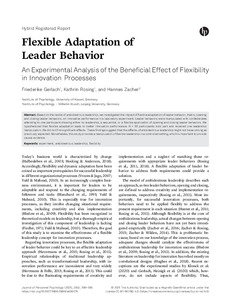| dc.date.accessioned | 2021-11-26T12:35:40Z | |
| dc.date.available | 2021-11-26T12:35:40Z | |
| dc.date.issued | 2021-06-01 | |
| dc.identifier | doi:10.17170/kobra-202110084861 | |
| dc.identifier.uri | http://hdl.handle.net/123456789/13411 | |
| dc.description.sponsorship | Gefördert im Rahmen eines Open-Access-Transformationsvertrags mit dem Verlag | ger |
| dc.description.sponsorship | This research was supported by a grant from the Deutsche Forschungsgemeinschaft (DFG), RO 4647/3-1 | eng |
| dc.language.iso | eng | eng |
| dc.rights | Attribution-NonCommercial-NoDerivatives 4.0 International | * |
| dc.rights.uri | http://creativecommons.org/licenses/by-nc-nd/4.0/ | * |
| dc.subject | experiment | eng |
| dc.subject | ambidextrous leadership | eng |
| dc.subject | flexibility | eng |
| dc.subject.ddc | 150 | |
| dc.subject.ddc | 300 | |
| dc.title | Flexible Adaptation of Leader Behavior | eng |
| dc.type | Aufsatz | |
| dcterms.abstract | Based on the model of ambidextrous leadership, we investigated the impact of flexible adaptation of leader behavior, that is, opening and closing leader behaviors, on innovative performance in a laboratory experiment. Leader behaviors were manipulated with confederates attending to one participant showing either no leadership, a sequential, or a flexible application of opening and closing leader behaviors. We hypothesized that flexible adaptation leads to better innovation performance. N = 93 participants took part and received one leadership manipulation. We did not find significant effects. These findings suggest that the effects of ambidextrous leadership might not be as strong as previously expected. Nonetheless, this study provides a manipulation of flexible leadership in a controlled setting, which is important to provide causal evidence. | eng |
| dcterms.accessRights | open access | |
| dcterms.creator | Gerlach, Friederike | |
| dcterms.creator | Rosing, Kathrin | |
| dcterms.creator | Zacher, Hannes | |
| dc.relation.doi | doi:10.1027/1866-5888/a000274 | |
| dc.relation.projectid | RO 4647/3–1 | |
| dc.subject.swd | Experiment | ger |
| dc.subject.swd | Führungskraft | ger |
| dc.subject.swd | Beidhändigkeit | ger |
| dc.subject.swd | Flexibilität | ger |
| dc.title.subtitle | An Experimental Analysis of the Beneficial Effect of Flexibility in Innovation Processes | eng |
| dc.type.version | publishedVersion | |
| dcterms.source.identifier | eissn:2190-5150 | |
| dcterms.source.issue | Heft 4 | |
| dcterms.source.journal | Journal of Personnel Psychology | eng |
| dcterms.source.pageinfo | 198-206 | |
| dcterms.source.volume | Jahrgang 20 | |
| kup.iskup | false | |


